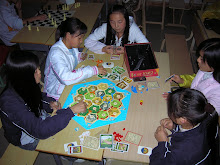A trip to the city is often one of the best forms of education. Passing on-street displays of small piles of dead snakes is not as strange as the crowd slowly gathering to listen to the salesman's pitch: This is REAL Chinese medicine, people. People still stare at me because they are not accustomed to seeing foreigners, only now I'm getting better at understanding the dialect. "Hey! Is that foreigner a man or a woman?" a man yells at his friend right in front of me.
"What?!" I ask him.
"I asked my friend if you were a man or a woman." he replies, surprised.
"Why don't you guess?"
"Man."
"That's right," I reply, storming off.
The city is the place where I can find a full spectrum of life: from people inviting me into their homes because I made conversation to those who look at me and tell everyone they are going to charge more money because I'm a foreigner. There have been moments of such acute anger defused by a friendly bus driver who lends a helping hand because I've taken his bus before.
I saw a man in a cheap blue suit running from a crowd. He tripped and then...well...let's just say the crowd wasn't following him to say that he'd won the lottery. He was a con man and he got caught in the wrong place: the middle of a crowd.
It's nice when students are with me in the city. If I get excited because there is a store full of honey they calmly redirect me, a child in a 26-year-old's body, while explaining that the honey is not real, only a "honey, sugar, and chemistry" [sic] mixture. Who knows what I would have ended up eating had I been alone.
I've been feeling better: not even a slight rumble in my stomach for the past three weeks. It has led to more adventures outside: pushing the limits of my Chinese to explore slender alleyways, finding new people to talk with, and telling my story once again. Are you familiar with the U.S.-China Friendship Volunteer Program? Well, it started when...
And the more I get out and stumble around (bodily and lingua-metaphorically), the more I realize that I'm creating a new story to tell later. The little mishaps and cherished successes that are becoming a part of my growth and change as a person. Sometimes I am frightened of this change. I can't remember simple English words on a regular basis. I struggled for over ten minutes to think of the word "sledgehammer" and even longer with "strainer." I find myself spitting on the street regularly and, once, when I spat on the floor in a restaurant, all of the other volunteers were aghast (but it's perfectly normal).
The word "maybe" has slipped into my vocabulary like a virus. I would do anything to get rid of this word, but it goes at the beginning of everything. Chinese culture is about indirect communication to avoid hurting anyone's feelings. Avoiding this is important because, in the collectivist thought and culture in which everyone lives, relationships are valued above nearly everything (you've heard of a white lie). And, thus, the maybe was added to everything. This prompted me to begin using the word in English, when it was relayed back to my students as a subtle signal: If he says 'maybe' in English, it must be how Americans talk. And so, I have discovered myself saying to people, "MAYBE you should turn in your homework," or "MAYBE I would like to go to bed now," when my true feelings are much stronger. Maybe you should the paragraph again to get an idea of what I'm trying to say.
I long for a good, personal story, but all I can think of lately are small events which passed quickly. I was going to expand the story about the fake honey but it would have involved a great deal of exaggeration and I didn't have the energy. I need all the energy I can for fending off the unending stream of students who want me to teach them English personally. Maybe I am too busy.
All the discussions of indirect communication have finally led me to a new understanding of communication. If someone asks me to teach them English "I am too busy." If I want to leave "I have friends waiting for me." If I don't want to do something "it's not convenient." If someone wants some of my time "I have something to do." All of these wonderful phrases are collectivist road signs. They defuse any situation I want to avoid because there is a long history of this shared language. There's an unspoken agreement between people who want to be indirect, and none of the reasons invite further inquiries. Nobody asks me about WHAT I have to do because they know that they may need to use this phrase in the future with someone else. Even though the phrases are used over and over again, obviously flat denials and thereby more direct in nature than one may think, they are unquestioned.
I would really like to continue this blog but I have friends waiting for me. Cheers.
4.25.2008
Subscribe to:
Post Comments (Atom)








No comments:
Post a Comment